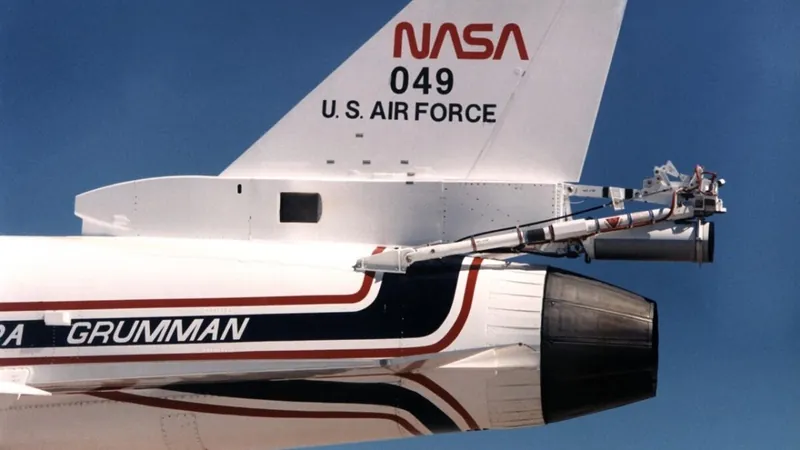
Uncovering the 7 Game-Changing Moments in Aerospace This Millennium: A 24-Year Journey
2024-12-30
Author: Chun
Since the establishment of NASA in 1958, we witnessed humanity's eternal quest to explore the cosmos, culminating in the monumental Apollo Moon landing in 1969. However, from 2000 to 2024, the landscape of aerospace has dramatically evolved, driven largely by the emergence of private companies and renewed interest in space exploration after a period of stagnation.
Join us as we reveal the 7 pivotal milestones that have redefined the aerospace industry over the past 24 years. While many incredible moments did not make our final cut, these selected highlights stand out in the narrative of our journey beyond Earth.
1. Artemis I: The Return to the Moon Begins
The Artemis program, heralding a new era of lunar exploration, gathered momentum with its Artemis I mission. This uncrewed mission, launching at the end of 2022, tested the Orion spacecraft's capabilities as it orbited the Moon. NASA's significant investment in this program symbolizes its commitment to returning humans to deep space, aiming for a crewed lunar landing in the upcoming missions.
2. The Historic Dragon Capsule Crew Flights
The retirement of NASA's Space Shuttle in 2011 left a void in manned space flights, with astronauts hitching rides on Russian Soyuz spacecraft. That changed dramatically in 2020 when SpaceX's Crew Dragon capsule became the first commercially-built spacecraft to transport astronauts to the International Space Station (ISS). This milestone not only revitalized U.S. human spaceflight capabilities but also marked the dawn of private sector involvement in crewed missions.
3. The Groundbreaking Detection of Gravitational Waves
A century after Einstein predicted their existence, scientists at LIGO announced the first detection of gravitational waves in February 2016. This groundbreaking achievement confirmed a vital aspect of general relativity and opened new avenues of exploration in astrophysics, allowing researchers to study cosmic events like black hole mergers in unprecedented detail.
4. The Rise of Space Tourism
The thrilling possibilities of space tourism materialized in the summer of 2021 as companies like Virgin Galactic and Blue Origin propelled civilian flights into suborbital space. The historic Inspiration4 mission in September 2021 sent an all-civilian crew into orbit, paving the way for private citizens to experience the beauty of space. With each successful mission, the allure of space travel beckons more than just astronauts, hinting at a future where space adventures are available to the masses.
5. China’s Bold Leap into Space Exploration
China has become a formidable player in the space race, marked by its ambitious Chang’e lunar program. The successful Chang’e 3 landing in 2013 and the remarkable Chang’e 4 mission that touched down on the Moon’s far side in 2019 highlight China's growing aerospace capabilities. With intentions to land humans on the Moon by 2030, China's advancements present a serious challenge to U.S. supremacy in space exploration.
6. SpaceX's Ingenious Rocket Recovery System
On October 13, 2023, SpaceX achieved a remarkable feat when it successfully captured the first stage of its Starship rocket in mid-air using a set of hooks—signifying a new benchmark in rocket recovery technology. This achievement not only demonstrates SpaceX's innovative approach but also sets the stage for reduced costs and increased sustainability in space launches.
7. The Spectacle of Falcon Heavy’s Launch
The Falcon Heavy’s inaugural launch in February 2018 was nothing short of cinematic, featuring a cherry-red Tesla Roadster sent into orbit. The powerful rocket, with 27 engines, highlighted SpaceX's capability to transport heavy payloads into space, forever altering public perception of private companies in the aerospace sector. It proved that commercialization of space could lead to extraordinary feats that captivated the imagination of millions.
In conclusion, these milestones underscore the transformative nature of the aerospace industry over the last two decades. With the contributions of both governmental agencies and private enterprises, the journey into the cosmos has only just begun. Will the next 24 years bring even more spectacular advancements? Buckle up, as we embark on an exhilarating journey into the future of space exploration!

 Brasil (PT)
Brasil (PT)
 Canada (EN)
Canada (EN)
 Chile (ES)
Chile (ES)
 Česko (CS)
Česko (CS)
 대한민국 (KO)
대한민국 (KO)
 España (ES)
España (ES)
 France (FR)
France (FR)
 Hong Kong (EN)
Hong Kong (EN)
 Italia (IT)
Italia (IT)
 日本 (JA)
日本 (JA)
 Magyarország (HU)
Magyarország (HU)
 Norge (NO)
Norge (NO)
 Polska (PL)
Polska (PL)
 Schweiz (DE)
Schweiz (DE)
 Singapore (EN)
Singapore (EN)
 Sverige (SV)
Sverige (SV)
 Suomi (FI)
Suomi (FI)
 Türkiye (TR)
Türkiye (TR)
 الإمارات العربية المتحدة (AR)
الإمارات العربية المتحدة (AR)